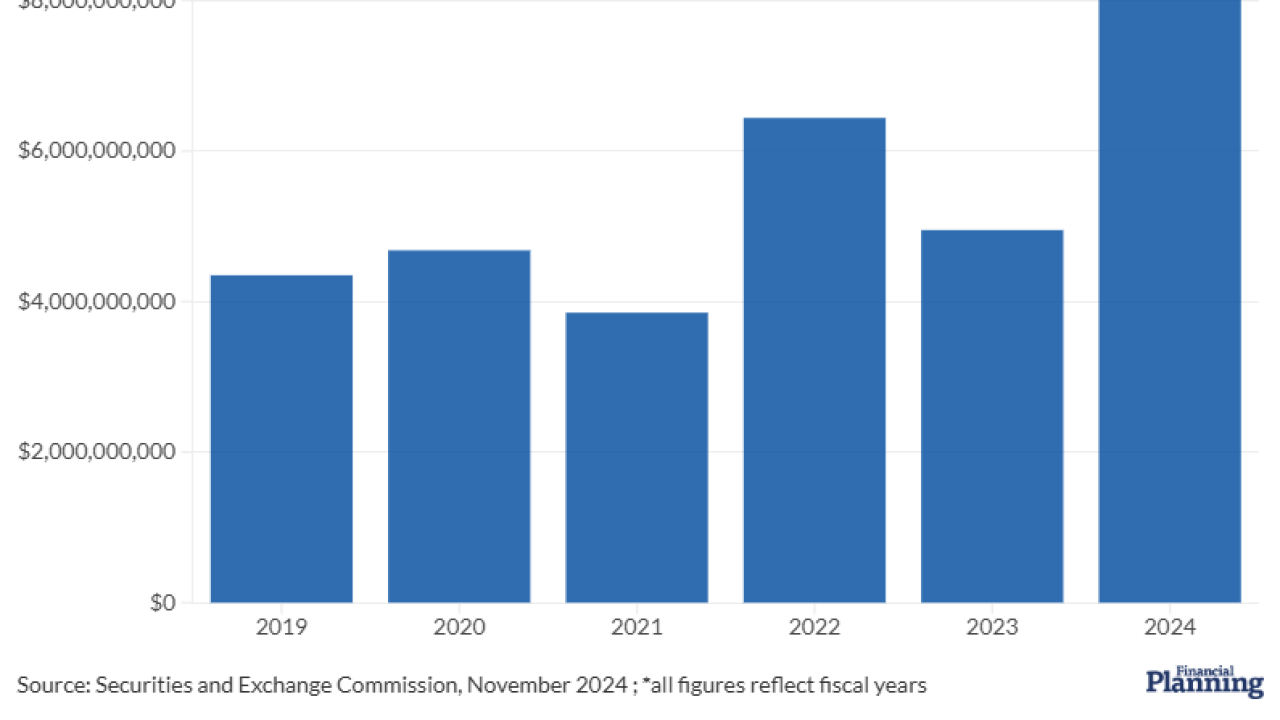SEC May Require Funds to Disclose Fees in Dollars
The Securities and Exchange Commission is considering forcing mutual funds to disclose fees and performance as simple numbers, SEC Chairman Christopher Cox told the Los Angeles Times.
Funds should report "one simple number that captures fees and expenses," he said, noting that the information is typically buried in fund prospectuses.
"It's our top regulatory priority," he said. "There are always technical concerns raised by someone, but the truth is that apples-to-apples comparisons are quite useful for consumers. The same should be possible for our retirement savings."
SEC Commissioner Roel C. Campos agreed: "If the government expects retirees to manage their own accounts, they need to know how their investments are doing, and right now, many don't know how they are doing."
Barbara Roper, director of investor protection at the Consumer Federation of America, applauded the idea. "It's a good concept: giving people simple, easily comparable information," she said. "The question is whether they'll come up with a number that is really meaningful."
SEC Makes Waves for
Hedge Funds in Cayman
Recent chatter about making hedge funds with a physical presence in the United States register with U.S. regulators is making waves in the Cayman Islands, according to the online Financial Times.
The Caribbean archipelago has a reputation as a paradise for vacationers and hedge funds alike, due to fund-friendly laws that allow hedge funds to open shop relatively quickly and then take a buyer-beware attitude to regulation.
Since the 1993 passage of the Mutual Funds Law, fund managers have used the less bureaucratic laws of the Cayman Islands to get a head start on competitors. Today, the Cayman Islands are home to 500 bank and trust companies and more than 8,000 hedge and mutual funds.
Besides less red tape, the Cayman Islands charge no direct tax on funds. Funds can apply for a 20-year tax waiver, and apply to extend their tax-exempt status later.
Some worry that much of the business will be washed away if the Securities and Exchange Commission passes a rule requiring any hedge fund with a presence in the U.S. to register here.
"If regulators in the U.S. and Europe are trying to protect the investor, they've got to understand that very little investment management is handled in Cayman," said Mark Lewis, a senior partner who specializes in hedge funds at law firm Walkers Global. "And if regulators are concerned about protection, they need look no further than their own jurisdictions."
The influx of institutional dollars into hedge funds may also pressure many managers to move to more closely regulated jurisdictions.
Bryan Hunter, partner at Cayman-based legal and administrative service provider Appleby Hunter Bailhache and one of eight directors of the Cayman Islands Financial Services Association, sees institutional money as no threat at all. "They are familiar with the jurisdiction, familiar with the regime, and they know that it is in accordance with international standards," Bailhache said. "The prospect of institutional investors not feeling comfortable with this regime is remote," he said.
Investors Want $500k Back
From Evergreen Security
Evergreen Security investors are trying to recover $500,000 from the Orlando-based firm, whose management perpetrated the largest consumer-investment scam in Florida history in the 1990s, according to the Orlando Sentinel.
The investors filed a lawsuit against Orlando law firm GrayRobinson to recoup fees the firm received from a former client accused of participating in the fraud. The lawsuit states that the law firm improperly withdrew $500,000 in fees from a fund that the firm held in a trust for financial adviser J. Anthony Huggins.
However, GrayRobinson claims the suit has no merit.
"It's a frivolous claim, and we will respond to it appropriately," said Biff Marshall, a partner with GrayRobinson. "Our firm was properly authorized by the client to withdraw those funds as payment for services."
Evergreen investors have targeted the Huggins trust fund held by GrayRobinson as part of an international effort to recover their losses.
Last year, an Orlando bankruptcy judge ordered Huggins and his associate Jon M. Knight to pay $8 million for their role in the scam, which cheated investors out of nearly $215 million. The two were also ordered into involuntary bankruptcy as part of the collection effort.
Huggins and Knight were accused of a Ponzi scheme that paid returns to initial investors using money raised from later investors. They denied the allegations and appealed the decisions, but it was recently upheld in the U.S. District Court.
Evergreen went into Chapter 11 bankruptcy. Lawsuits and criminal chares were filed against the perpetrators. Bankruptcy trustee Bill Cuthill, Jr. tried to find a lot of the money, which was put away in offshore accounts. Two years ago, when Evergreen emerged from bankruptcy, investors hired Cuthill as the operation's president. Cuthill states that he recouped around $27 million of the money.
Manager Defrauded 250
Investors of $7 Million
Francis William Reimers pled guilty to charges by the Federal Bureau of Investigation and the Internal Revenue Service that he defrauded hundreds of mutual fund investors. He accepted six counts of mail fraud and one count of money laundering, U.S. Fed News reports.
The government said that Reimers' company, Advisory Services Group, promised investors returns of at least 9% by using a "regression analysis" program that could detect whether mutual fund values would rise or fall.
But instead of investing money, he used it for his mortgage, luxury cars, vacations, hunting trips and to finance two 403(b) and 457 fund administration companies he ran. He then paid investors in his fund management firm who wanted to redeem their shares or receive monthly dividends by dipping into the monthly payroll deductions of his fund administration companies.
To cover up his scheme, he sent bogus statements to investors that falsely indicated their money was invested in various equity and money market mutual funds.
Reimers, who will be sentenced on Aug. 3, faces up to 20 years in prison for each count.
SEC Charges Manager
With Not Reporting Trades
The Securities and Exchange Commission has filed fraud charges against Geoffrey Brod of Avon, Conn., a former portfolio manager with Aeltus Investment Management, now ING Investment Management, for not reporting 3,500 personal trades he made between 1999 and 2003 that earned him profits of $410,000. Many of the stocks Brod bought and sold he also held in mutual funds that he ran.
The SEC said Brod also breached Aeltus's ethics code, which barred him from shorting stocks.
Brod hid his trades from the firm by submitting false quarterly and annual reports and falsely certifing that he had complied with the firm's ethics code. Aeltus fired him in 2003.
"Investment professionals must conduct their personal stock trading in accordance with restrictions imposed by their firms' code of ethics and the federal securities laws," said Randall Lee, regional director of the SEC's Pacific Regional Office. "Brod executed thousands of trades in utter disregard of those restrictions and deliberately evaded them for personal gain."
China Dragging Heels on
Approving New Funds
Chinese regulators are likely to take their time approving the 50-plus new mutual funds that are awaiting their approval, sources tell Reuters. Regulators are afraid investors will sock large sums of money in the new offerings, inflating the value of the market.
This is causing some concern among fund managers, who are anxious to bring new offerings to market.
The China Securities Regulatory Commission reportedly sent a letter to fund companies last month, letting them know that approval for new products might take longer than the usual two or three months and asking them to be patient. The regulator also stressed that fund companies must make it clear to investors when selling fund shares that there are inherent risks in investing in the stock market.
"Obviously, now the regulator is not worried about how much further the benchmark stock index can climb but is worried about how it can cap the speed of the climb before the market becomes overheated," a source said. China's benchmark index rose 130% in 2006.
"The demand for new fund issuance so far this year is much stronger than regulators had expected," the source added. "After the freeze at the beginning of this year, it is even harder for regulators to make approvals at their usual pace."
Top Hedge Fund Managers
Earned $1B-Plus in 2006
Five of the most successful hedge fund managers earned $1 billion or more-each-in 2006, Reuters reports, while the average earnings for the top 100 managers was $241 million. Top performers delivered returns of 30% to 40% last year.
John Arnold, who only recently launched hedge fund Centaurus Energy, made the right call on natural gas prices, earning himself between $1.5 billion and $2 billion, and his investors, returns of 317%.
James Simons of Renaissance Technologies, Edward Lampert of ESL, Steve Cohen of SAC Capital Advisors and T. Boone Pickens each earned $1 billion.
Funds' Increasing Use of
Derivatives Raises Concern
Regulators and fund watchdogs are keeping their eye on mutual funds that are increasingly using complex products such as derivatives to boost returns, according to the Chicago Tribune.
Derivatives have been used by hedge funds for a long time, but now they are appearing in ordinary diversified stock and bond funds that often serve as core holdings for small investors. In fact, Eaton Vance, Federated Investors and Rydex Investments recently launched funds that rely on derivatives as a core strategy.
Although Warren Buffett once called derivatives "financial weapons of mass destruction," their use is growing as they become easier to trade and mutual funds increasingly look to distinguish themselves.
Also a concern is that many funds that use derivatives strategies can hit fund investors with large tax bills, since the funds usually trade often and can generate more short-term capital gains.
Additionally, regulators have concerns about the product. "I am not trying to say that funds should not invest in these instruments, but I am saying that you should do a lot of work up front before you wade into uncharted territory," Andrew Donohue, director of the division of investment management at the Securities and Exchange Commission, recently said.
(c) 2007 Money Management Executive and SourceMedia, Inc. All Rights Reserved.
http://www.mmexecutive.com http://www.sourcemedia.com





